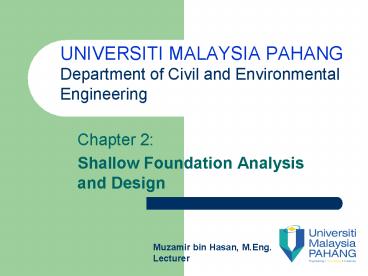Shallow Foundation Analysis and Design - PowerPoint PPT Presentation
1 / 39
Title:
Shallow Foundation Analysis and Design
Description:
Shallow foundations transfer structural loads to relatively small depths ... inside a sump, usually partly backfilled with gravel to prevent the development ... – PowerPoint PPT presentation
Number of Views:8678
Avg rating:5.0/5.0
Title: Shallow Foundation Analysis and Design
1
UNIVERSITI MALAYSIA PAHANG Department of Civil
and Environmental Engineering
- Chapter 2
- Shallow Foundation Analysis and Design
Muzamir bin Hasan, M.Eng. Lecturer
2
Shallow Foundations
- Shallow foundations transfer structural loads to
relatively small depths into the ground. - Range from isolated foundations, each carrying
its own column load, to elements carrying several
load columns, walls or even all the loads for a
given structure or building.
3
ADVANTAGES OF USING SHALLOW FOUNDATION
- 1- Cost (affordable)2- Construction Procedure
(simple) 3- Materials (mostly concrete)4- Labor
(does not need expertise)
4
(No Transcript)
5
Shallow Foundations
6
Shallow Foundations
7
Shallow Foundations
8
Shallow Foundations
9
Shallow Foundations
10
Shallow Foundations
11
Shallow Foundations
12
(No Transcript)
13
DISADVANTAGES OF USING SHALLOW FOUNDATION
- 1- Settlement2- Limit Capacity Soil
Structure3- Irregular ground surface (slope,
retaining wall)4- Foundation subjected to
pullout, torsion, moment.
14
Shallow vs. Deep Foundations
15
Shallow Foundations
- Usually the more economical option
- As a general rule, consider deep foundations only
when shallow foundations do not give satisfactory
design - Types of Shallow foundations
- Spread footings (square, circular, rectangular)
- Combined Footings
- Continuous Footings
- Mat or Raft Foundations
16
(No Transcript)
17
(No Transcript)
18
Combined/Strap Footing
19
Construction Methods
- Excavation Backhoe followed by handwork
- Neat footing-no formwork used
- Formed footing
20
Construction of Shallow Foundations
21
Construction of Shallow Foundations
22
Construction of Shallow Foundations
23
Construction of Shallow Foundations
24
Construction of Shallow Foundations
25
Construction of Shallow Foundations
26
Construction of Shallow Foundations
27
Construction of Shallow Foundations
28
Basic Construction Specifications and Items for
Inspection
- 3 construction requirements must be address in
the construction specification for footings in
soil- - Minimum depth to base of footing
- Certain minimum distances with the respect to
buried utilities, cavities, or other foundation
elements - Sequence of construction of individual footings
29
Basic Construction Specifications and Items for
Inspection
30
Basic Construction Specifications and Items for
Inspection
31
Example 8-1
- Youre designing a square footing near the
property line of an adjacent structure. The local
municipality owns an easement along the property
line for a sewer pipe with diameter equal to 0.5
m and an invert depth of 4 m below grade. At what
distance from the property line and at what depth
would u consider placing your footing?
32
Example 8-1
33
Solution
34
Basic Construction Specifications and Items for
Inspection
35
Construction Inspection
- Base elevation
- Nature and type of soil at the base of the
excavation - Base cleaning before concrete placement
- Dimensions and cross section of footings, grade
beams and other foundation elements - Concrete placement
- Time for concrete placement
- Footing integrity after concrete placement
36
Dewatering
- Sump pumping
- Wellpoints
37
Sump Pumping
- Under CERTAIN conditions, be effective
- Pump placed inside a sump, usually partly
backfilled with gravel to prevent the development
of quick condition - GW accumulates within the sump as it surfaces,
from which it is pumped out
38
Wellpoints
- Installed in series along the borders of the zone
to be dewatered - Effective for relatively clean sand
- Higher fines content may lead to wellpoint
clogging
39
Wellpoints

